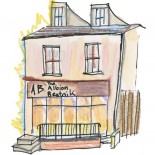The Albion Beatnik Bookstore website (or how to change a light bulb in a tight space on a ladder)
The web page of the Albion Beatnik Bookstore, based once in Oxford, then Sibiu, always neo-bankrupt, now closed for business: atavistic and very analogue, its musings and misspells on books and stuff.
A Bookseller’s Pompous Manifesto
|
Publisher John Murray wrote in 1842 that “I am very sorry to say that the publishing of books at this time involves nothing but loss.” The plights of publishing and bookselling reflect their society, of course. Independent bookshops, so eulogised by Saturday’s goofy Guardian editors, have seen mass closure in recent years, and even the chains with their hitherto number crunching security are in retreat; just as Tesco finished off the local butcher and candlestick maker, so too the digital onslaught of the internet and Kindle is seen as the coffin of the visceral bookshop experience. In truth the digital experience is but a nail in the coffin lid, as the ubiquity of television culture and computer games galore, declines in literacy and the stench of heresy in the (wretched) National Curriculum which suggests that a book serves only to provide a child with the tools to read rather than to be enjoyed as an object of pleasure – all these have killed off any sense that the book is a pillar of society’s well being. Amidst this fracas, the whole point about a book seems to have been lost: it reflects its buyer, at least at the time of its having been read, which is why we read them once and then house them forever, or even buy them with only the slightest intention of reading them. Books are vital life signs, to be cherished and chosen with care, as they represent who we are as we travel on our life’s journey. Although great fun can be had comparing bookish notes with friends, it would be sad if each of us wanted to read only the same books. There is nothing more inclined to encourage snobbery than books. It is often thought that Maeve Binchy and Zane Grey are only opiates for the masses (not true), and that Knut Hamsun can only be read by those with a degree (also not true), and I am still bemused by some who come in to the Albion Beatnik Bookstore in Walton Street (which runs “the gamut from A to B,” as Dorothy Parker might have quipped) with only a predisposed intention of being dismayed by what it has to not offer them: if you think only with footnotes (and recite a bibliography at bedtime instead of prayers) you may miss out on a lot of what any bookshop can offer you. The true book lover is promiscuous both in reading and buying habit, and is open to every experience: so there is a place both for the boffin who wants Latin verse in alphabetical order and for the more sensual reader who is swayed by cover design, typography, the smell of coffee and all else that may be held to cheapen learning. The current tide of homogenization is never more evident than in bookselling, despite the breadth of titles on offer. As clothing shops tend to weigh more heavily on one or two ‘in’ colours each season (even though there is a vast array to choose from), so booksellers are seemingly encouraged to offer a smaller number of books; a few notable exceptions buck the trend as they are able, but when bookshop chains sell the space at the front of their shops to publishers for display, and every financial inducement to buy this bizarre bazaar is writ large (three for two, half-price, and so on), then true bookselling – offering ordered choice and considered enthusiasm – is out for the count. Of course, the customer, even if he or she isn’t always right, can benefit greatly from such blandishment, and in any case bestsellers are not as ephemeral and throwaway as they used to be (although this season’s Argos catalogue could well top the bestseller charts): from the late 1940s books of lasting interest began to find larger markets, and now books of true literary and scholarly merit can sell in large numbers. Yet how sad that today books are flogged as baked beans are in a supermarket; yet even sadder that readers are driven exponentially to use price and exposure as often their only means of choice. Sometimes a book is worth reading because it is worth reading, a thought that should fashion the backbone of every book emporium and customer, even if one’s reflex is often exposed to publishing largesse. Incidentally, the slowest selling book is estimated to have been David Wilkins’ translation of the New Testament from Coptic into Latin, published in 1716 by the estimable Oxford University Press, and which took until 1907 to sell its 500 copy print run. The Albion Beatnik Bookstore has over 800 feet of shelving dedicated to (almost) equally slow selling titles, including the expected (William Golding), the unexpected (Anna Kavan), the homely (Georgette Heyer) and the outrageous (French Surrealism): not too many bestsellers there, but a wealth of browsing interest and serendipity. |

